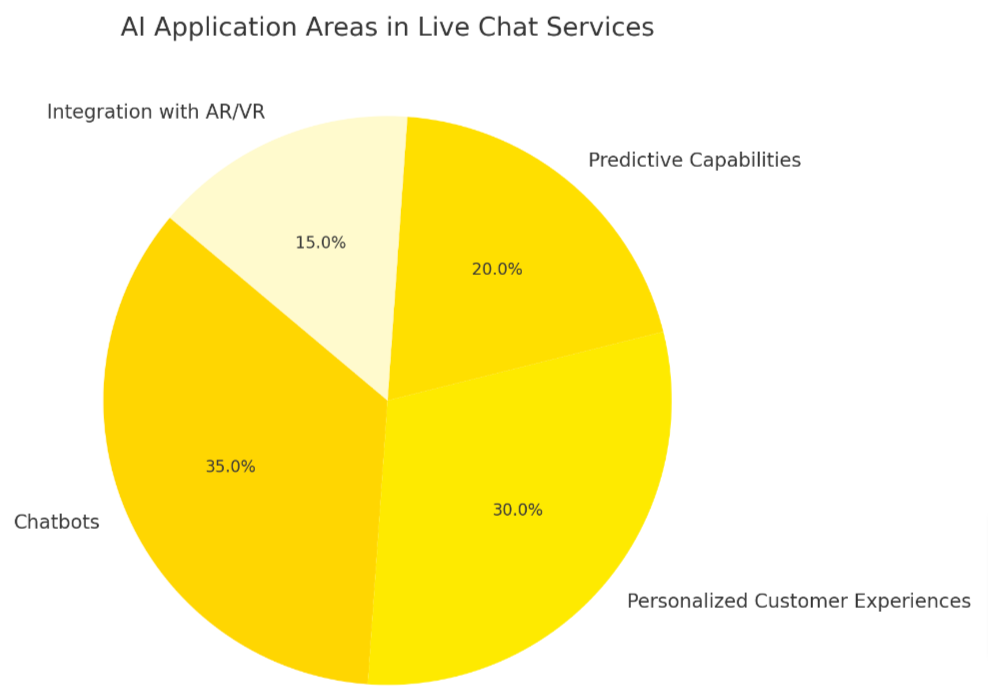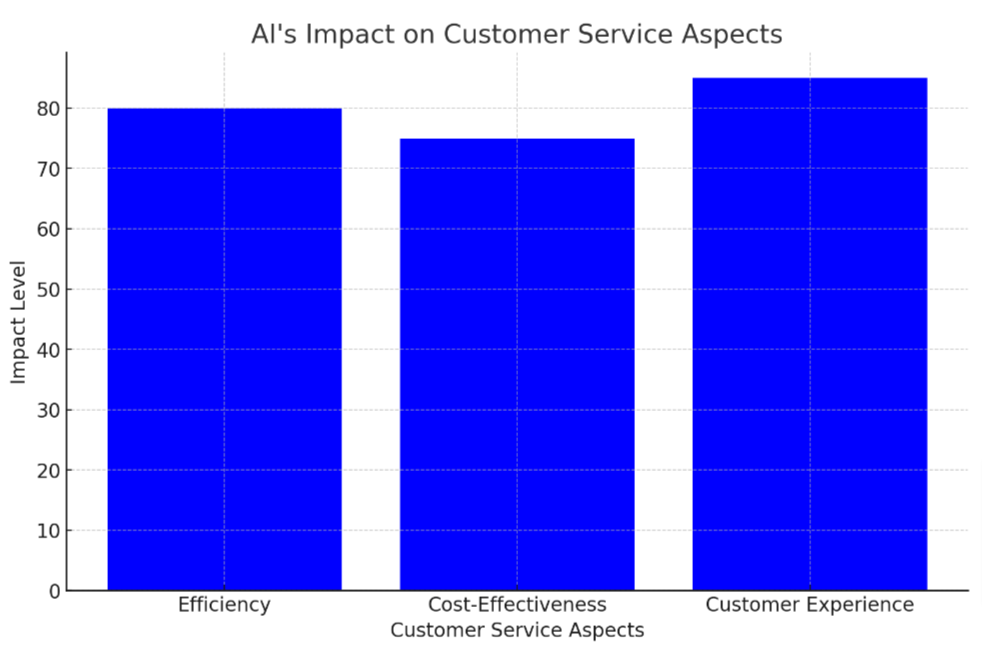Embracing Change: AI and Automation’s Impact on Live Chat Services
Waiting for help online can feel like an eternity. Chatbots powered by AI are changing that, handling queries faster than ever. Our post dives into how this tech not only speeds things up but also makes support smarter and more personal.
Keep reading – the future is chatting back!
Key Takeaways
- Chatbots equipped with AI are becoming smarter, able to learn from interactions, and provide personalized service around the clock, even predicting customer needs before they’re expressed.
- Integrating AI with live chat enhances efficiency by handling multiple queries at once and offering immediate assistance 24/7; this leads to better use of resources and higher customer satisfaction while cutting down operational costs.
- Advances in natural language processing allow for more human-like conversations between customers and AI chatbots, resulting in more effective communication and problem-solving.
- The combination of AI with technologies like augmented reality (AR) and virtual reality (VR) will create immersive customer support experiences that are interactive and engaging.
- As artificial intelligence continues transforming the digital customer journey, businesses can anticipate user needs more accurately, fostering loyalty through tailored support automation.
The Growing Role of AI in Live Chat Services
AI is becoming increasingly prominent in live chat services, with the rise of chatbots, personalized customer experiences, and enhanced predictive capabilities shaping the future of customer interactions.
Increased use of chatbots
Businesses everywhere are turning to chatbots as a cornerstone of customer service. These AI-powered virtual assistants handle inquiries 24/7, providing instant responses to common questions.
They’re always ready, quick on the draw with answers or helpful hints, and never need a coffee break. This relentless efficiency frees up human agents for more complex issues that demand a personal touch.
Chatbots have evolved from simple scripted responders to dynamic tools armed with machine learning. As they interact with customers, these bots learn and adapt, making each conversation smoother than the last.
Realtime data enriches their understanding and equips them for an increasingly wide array of tasks in the tech world. The future holds major advances for these digital helpers as they become even more integrated into live chat services, reshaping every interaction into an opportunity to impress and retain customers.
Personalized customer experiences
AI-driven live chat services are transforming customer interactions into personalized experiences. Virtual assistants collect real-time data from each interaction and use machine learning to adapt responses based on customer preferences and history.
This tailored approach makes customers feel understood and valued, fostering a stronger connection with the brand.
Engaging with customers using automation doesn’t mean sacrificing personal touch. Chatbots now predict what a customer is looking for by analyzing past behavior patterns and offering solutions even before the customer asks.
Such proactive support revolutionizes the digital transformation of customer service, ensuring that every user feels their unique needs are being met efficiently.
Enhanced predictive capabilities
Enhanced predictive capabilities in AI and automation are revolutionizing customer support like never before. With machine learning, chatbots can now predict what a customer needs before they even ask.
They analyze past interactions, pull from vast amounts of realtime data, and deliver solutions that feel personalized and proactive.
These virtual assistants don’t just respond to inquiries; they anticipate issues and offer smart suggestions that save time for both customers and businesses. As these technologies advance, the line between human and machine-powered help becomes blurred, paving the way for a more intuitive digital transformation in the customer service industry.
Next up is an exploration into the evolving debate around AI’s role in customer service – a topic sparking conversations across the tech world.

Evolving Debate Around the Role of AI in Customer Service
There is a growing debate around the impact of AI on customer service, with concerns about ethical implications and its potential effect on human jobs. However, there are also arguments for the benefits of implementing AI in providing efficient and cost-effective customer support.
Potential ethical concerns
Ethical concerns surrounding AI in customer service revolve around data privacy and the responsible use of customer information. Companies must ensure that AI-driven systems prioritize customer privacy and comply with data protection regulations.
Transparency in how AI processes and uses customer data is essential to build trust. Additionally, there is a need for clear protocols on how AI handles sensitive issues and ethical dilemmas during customer interactions, ensuring that it aligns with human-centric values.
Moreover, the potential displacement of human jobs by AI in live chat services raises ethical questions about unemployment rates. Ensuring a balance between automation and human input is crucial to preserve job opportunities while leveraging the benefits of AI technology.
Impact on human jobs
AI and automation in live chat services have raised concerns about their impact on human jobs in the customer service industry. As companies increasingly rely on chatbots and automated processes to handle customer interactions, there is a growing fear that these technologies will replace human customer support agents.
The integration of AI and automation has led to discussions about the need for a hybrid approach that combines technology with human expertise.
Technology advancements such as chatbots, machine learning, and virtual assistants are reshaping the customer service landscape, leading to changes in the nature of jobs within this sector.
It’s essential for businesses to consider how these technological shifts will affect the workforce while finding ways to leverage AI and automation without disregarding the value of skilled human labor in delivering exceptional customer experiences.
The Benefits of Implementing AI in Customer Service
Implementing AI in customer service brings improved efficiency and cost-effectiveness, ultimately leading to an enhanced customer experience.
Improved efficiency
AI and automation in live chat services result in improved efficiency. Chatbots can handle multiple customer inquiries simultaneously, providing quick responses and freeing up human agents to focus on more complex issues.
These automated tools also ensure 24/7 availability, offering timely assistance to customers without delays or waiting times.
Implementing AI in customer service operations streamlines repetitive tasks such as data entry and basic troubleshooting, allowing companies to allocate resources more effectively.
Cost-effectiveness
Implementing AI in live chat services can significantly reduce operational costs. Chatbots provide 24/7 support, minimizing the need for large customer service teams, thus cutting down on labor expenses.
Moreover, these automated systems can handle multiple customer interactions simultaneously, increasing efficiency and reducing the overall cost per interaction.
Moving forward to discuss \”The Future of AI in Live Chat Services\”, it’s essential to explore how advancements are shaping the functionality and capabilities of this technology.
Enhanced customer experience
Transitioning from cost-effectiveness, the integration of AI and automation in live chat services leads to an enhanced customer experience. Chatbots provide personalized interactions and real-time support, ensuring efficient query resolution.
This improves customer satisfaction while enabling businesses to gather valuable data for enhancing their services further.
Furthermore, AI enables predictive capabilities, allowing proactive engagement with customers based on their preferences and behavior. This not only fosters stronger customer relationships but also streamlines the overall customer journey in the digital age.

The Future of AI in Live Chat Services
AI in live chat services will continue to advance with improvements in natural language processing, integration with other technologies, and shaping the customer journey in the digital age.
To learn about these exciting developments, read more on our blog!
Advancements in natural language processing and understanding
Natural language processing and understanding have made significant strides in the realm of AI for live chat services. Machines are now better equipped to comprehend human language nuances, allowing for more accurate responses and improved customer interactions.
These advancements enable chatbots to understand context, slang, and colloquialisms, leading to more meaningful and effective conversations with customers. As a result, businesses can provide faster and more precise resolutions while enhancing overall customer satisfaction.
Furthermore, these developments foster a seamless integration between AI-driven tools and live chat services, streamlining communication processes in the digital age. As natural language processing continues to evolve, its impact on customer service is poised to revolutionize the way businesses interact with their clientele.
Integration with other technologies (AR, VR, etc.)
AI and automation in live chat services are set to integrate with other cutting-edge technologies such as augmented reality (AR) and virtual reality (VR). This integration will enhance customer experiences by allowing for immersive interactions, personalized assistance, and visual demonstrations.
By combining AI-powered chatbots with AR and VR, businesses can revolutionize the way they engage with customers, providing them with a seamless blend of real-time data analysis and interactive support automation.
Additionally, this integration will pave the way for a more dynamic, hybrid approach to customer service that leverages major advances in technology to create unforgettable customer interactions.
The fusion of AI and automation with AR and VR is expected to reshape the tech world’s perception of live chat services. This innovative combination promises to elevate not only customer feedback but also the overall digital transformation within the industry.
The synergy between these technologies highlights a significant shift towards using virtual assistants empowered by machine learning algorithms that analyze vast amounts of data, ultimately redefining how companies approach their customer experience strategies.
Shaping the customer journey in the digital age
The digital age has revolutionized the customer journey, with AI playing a pivotal role in shaping the overall experience. Customers now expect seamless interactions across various touchpoints, and AI enables businesses to provide personalized and efficient services.
By leveraging real-time data and advanced analytics, companies can anticipate customer needs and deliver targeted support automation. This not only enhances customer satisfaction but also fosters brand loyalty, ultimately driving business growth in today’s tech world.
Furthermore, AI integration with live chat services allows for immediate responses to customer feedback and issues, creating a more responsive approach in the customer service industry.
As technology continues to advance, the use of virtual assistants powered by machine learning will further transform the landscape of customer interactions. These major advances are redefining the way businesses engage with their customers during each step of their journey while providing valuable insights through robust data analysis.
Conclusion
As AI and automation continue to advance, they will shape the future of live chat services. Chatbots will evolve with enhanced natural language processing and understanding. Integration with AR, VR, and other technologies will further revolutionize customer interactions.
The tech world can expect major advances in customer service industry driven by artificial intelligence and automation.

